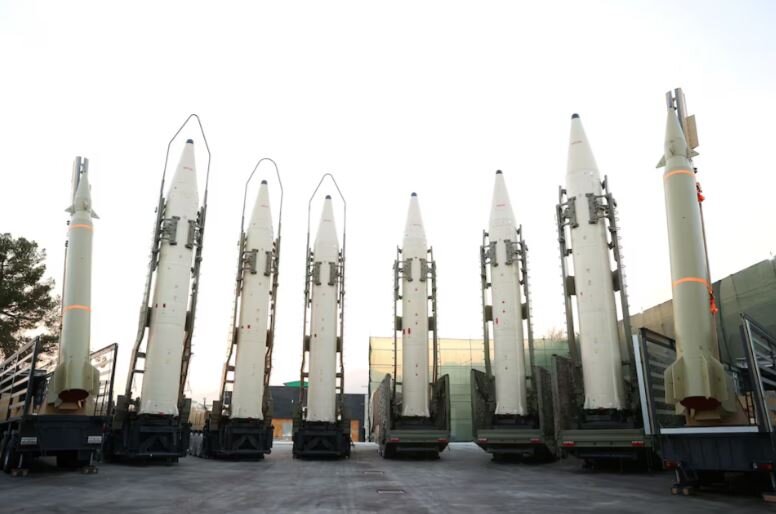Iran-Russia partnership and American allegations of Tehran’s missile supply to Moscow

Madrid – Last week, U.S. media outlets such as the Wall Street Journal reported, citing anonymous sources, that Washington believes Iran has sent ballistic missiles to Russia for use in the Ukraine conflict.
In response to these claims, a spokesperson for the European Union's diplomatic service stated on Monday: "We have received reliable information from our allies indicating that Iran has sent ballistic missiles to Russia." However, John Kirby, spokesperson for the White House National Security Council, refuted these claims, stating that he could not confirm media reports about Iran's missile transfers to Russia.
In reaction to these allegations, the Ukrainian Ministry of Foreign Affairs summoned the Iranian chargé d'affaires in Kyiv.
In a statement released on Monday, the Ukrainian Ministry expressed deep concern over the potential transfer of Iranian ballistic missiles to Russia and called on the international community to increase pressure on Tehran and Moscow to "maintain international peace and security." The statement also warned that the deepening of military and technical cooperation between Russia and Iran represents a serious security threat not only to Ukraine but also to Europe, the Middle East, and the world at large.
The Islamic Republic of Iran has vehemently denied these accusations. Nasser Kanaani, spokesperson for the Iranian Ministry of Foreign Affairs, stated that Iran opposes war and supports a political solution to the Russia-Ukraine conflict. "We have a clear stance on the Ukrainian crisis and regret that some parties, which are themselves part of the conflict, make accusations against Iran with political motivations. We are not a party to the war in Ukraine and have repeatedly emphasized that a political solution is the best way to resolve this crisis," Kanaani said.
Iran's mission to the UN also addressed the allegations in a statement to CNN, asserting: "The Islamic Republic of Iran's stance on the Ukrainian conflict has not changed. Iran believes that sending military assistance to the warring parties, which exacerbates human and infrastructural losses and moves the parties further from ceasefire negotiations, is inhumane. Therefore, not only do we not engage in such actions, but we also call on other countries to cease supplying arms to the warring parties."
In addition to diplomatic reactions, General Fazlollah Nozari, deputy commander of the Central Headquarters of Khatam al-Anbiya, denied the claims of Iranian missile transfers to Russia, stating: "The Islamic Republic of Iran’s position on the Ukraine war, which we have declared repeatedly, is that we do not support either side in the conflict and do not consider this war legitimate. No missiles have been sent to Russia, and this claim is a form of psychological warfare."
Iran has reiterated that while it maintains military cooperation with Russia, this does not grant Russia authorization to use Iranian military equipment against Ukraine. Since the onset of the Ukraine conflict, both the current and previous Iranian administrations have expressed neutrality and advocated for diplomatic solutions to achieve a definitive ceasefire.
Russia has played a pivotal role in Iran's foreign policy, engaging in regional collaborations and arms supplies. Given the confrontation with the United States and the unpredictable situation in West Asia, Iran has sought to maintain friendly relations with Russia. Russia has been one of Iran’s primary partners in its foreign policy, both internationally and regionally. Iran’s independent foreign policy and its differences with the West, especially the United States, have led it to seek a strategic relationship with Russia as its principal global ally.
Key Factors in Iran-Russia Relations
1. Independent Foreign Policy of Iran: By adopting a policy of independence, Iran has found Russia a crucial partner to counterbalance the influence of the United States and its allies in West Asia.
2. Collaboration in the Caspian Region: Iran and Russia’s shared interest in countering U.S. influence in the Caspian region has led to significant cooperation, especially in contexts like the Syria conflict.
3. Syrian Cooperation: Despite differences, Iran and Russia have aligned their positions in Syria to confront U.S. hegemony in the region. While Russia has supported President Bashar al-Assad, their collaboration has helped overcome disagreements about Syria’s and West Asia’s future.
It is important to note that the economic pressures imposed by the United States on both Iran and Russia, though driven by different motivations, have placed both countries in a similar economic situation. This has led them to seek common solutions to mitigate the impact of these sanctions.
However, this does not imply that strategies to circumvent or lessen the impact of sanctions translate into a shared political vision, nor that cooperation between the two nations is free of friction. A recent example of such tensions is Russia's support for the Zangezur Corridor in Armenia, an issue that has caused disagreements between the two allies.
In summary, while political and military collaboration has been central to Iran’s defense strategy, providing access to advanced technology and enhancing its capacity to face external threats, it does not mean that Iran adopts Russia’s political perspective. Specifically, regarding Ukraine, since the crisis began, the Islamic Republic has maintained an active neutrality stance. This stance involves not only staying out of the conflict but also actively seeking diplomatic solutions to resolve it.
Leave a Comment